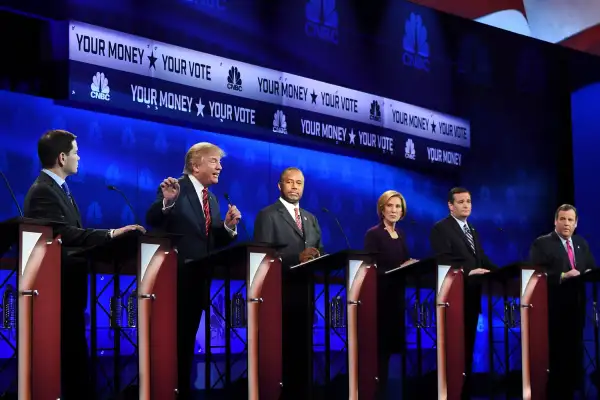Here's What the Republicans Plan To Do About Taxes and Social Security

In any American election campaign, there are always two contrasting pulls: the utopian vision of the city on the hill, and the fire-and-brimstone look into the abyss. In the Republican party, the city on the hill is one with a flat tax rate. And the fire and brimstone comes in the form of cuts to Social Security.
In last night’s debates the Republican candidates started sorting themselves between the two poles, dividing roughly into the optimistic tax cutters (let’s call them Ten Percenters) and the pessimistic entitlement cutters (the Hard Truthers).
The Ten (Or, Umm, Fifteen) Percenters
Once upon a time—meaning the 1996 Steve Forbes campaign—the idea of a flat tax was a radical fantasy dismissed by both major parties. Back then, “flat tax” meant a 17% federal income tax rate, coupled with payroll taxes for Medicare and Social Security.
Cue 2016. What was radical then is positively modest by the standards of today’s debate. Carly Fiorina proposes the three (count ‘em!) page tax code. Donald Trump has the “I win!” tax form. And Ted Cruz has the postcard tax form, which is pretty much the winner in the detaxification sweepstakes.
After several month of playing the Republicans’ lead fire-breather, Cruz used last night’s debate to show the sunnier side of his disposition, jumping into the lead of what you might think of as the tax optimists. While Ben Carson hedged on his much publicized calls for a 10%-ish tax (“It’ll be closer to 15%” he said last night), Cruz happily picked up the banner, calling for 10% across the board. Make no mistake, every one of the candidates promised lower taxes, but Cruz had the low bid.
What’s really extraordinary about the Cruz plan is that, beyond the flat 10% income tax rate, there’s no provision for a payroll tax. If you watched the debate and wondered if you’d somehow missed a quick reference to “plus the Social Security tax, etc. etc.”—well, you didn’t. That puts Cruz well below Carson and Rand Paul. (Paul sounds positively wonky by comparison with his 14.5% proposal—there’s even a decimal point in there!) And it leaves most of the rest of the field—folks like Jeb Bush, Marco Rubio, and Trump, who are still arguing for several different tax rates—looking like socialists.
The Hard Truthers
If the promise of lower—way, way lower—taxes is the very sweet carrot waved around in this debate, big cuts in Social Security and Medicare are the bitter greens.
Chris Christie planted his flag most conspicuously in this less sunny end of the Republican garden. Most of the candidates talked about the threat to the solvency of the Social Security system, but only John Kasich, Paul, and Christie seemed to do it with enthusiasm. Or in Christie’s case, gusto. The New Jersey governor came into his own decrying how the “government has lied to you and they have stolen from you.”
In Christie’s idiosyncratic telling, Social Security is going to be insolvent in “seven or eight years” and the only way to keep it afloat is dramatic cuts in benefits. What he's arguing for, specifically, is means testing, whereby upper-income retirees wouldn't get their full share as envisioned under the current system.
A Pew survey a year and a half ago found the clear majority of Americans—61% to 74% of them, depending on age—opposed to cuts in Social Security. So until quite recently means testing for Social Security would have been written off as politically radioactive by just about anyone. Now Christie’s embracing it, Rand Paul is advocating it, and Kasich seems to be accepting it.
Read next: How the Budget Deal Will Change Medicare and Social Security
The Bottom Line
Count on the utopians to win out as the campaign goes on. Nobody has a better ear for what Americans want to hear than Donald Trump, and it was Trump who sounded most breezy on concerns over Social Security: “It's very simple,” said Trump. "We're going to bring jobs and manufacturing back. We're going to cut costs. We're going to save Social Security." In other words, somehow it will all work out.
If the tenor of yesterday's debate is any guide, whoever wins the Republican nomination will campaign on a major flattening of the tax curve, if not a full-out flat tax. You’ll watch the fear of Social Security insolvency spike through the campaign, then decline as it gets closer to the election. If some part of that utopian agenda comes to pass, at some point there will also be a big hole to fill in the government budget (read: new taxes). But that’s for the 2020 elections.
Read next: Where the 2016 Democratic Candidates Stand on College Affordability
